In this episode, we speak to Tor and Christian Carver, the founders of William’s Den – a unique adventure attraction in East Yorkshire.
Five years ago, Tor and Christian constructed a plan to create a visitor attraction that offered children, and adults, the freedom to roam and play. The duo both grew up on farms and took inspiration from the time they spent endlessly exploring pastures, building dens and using their wild imaginations to entertain themselves.
Since its opening in 2017, William’s Den has gained plenty of admirers and recognition. They were regional finalists in The Rural Business Awards North – and winners in the Remarkable East Yorkshire Tourism Awards (REYTA) and the RICS Awards (which showcase the most inspirational initiatives and developments in land, real estate, construction and infrastructure).
“Every little detail, we care about. We don’t let anybody run off without us saying no or yes. We’ve always got the final say. And I think that’s key when it’s your business, your baby, your vision.”
What will you learn from this podcast?
- The inspiration behind William’s Den
- The importance of play and freedom to children’s development
- What the team’s creative and research process looks like
- The team’s main challenges and how they were overcome
- How to get recruitment right and the value of training employees
- The importance of sustainable design and how to implement it
- How the attraction received 50,000 visitors in their first three months of opening
- Top tips for those who want to build an adventure attraction
To listen to the full podcast, search Skip The Queue on iTunes, Google Podcasts and Spotify to subscribe. You can find links to every episode and more at www.rubbercheese.com/podcast.
You can also read the full transcript below.

William’s Den is an award-winning adventure attraction in East Yorkshire
The interview
Your hosts, Kelly Molson and Paul Wright
Our guests, Tor and Christian Carver
Kelly Molson: Tor and Christian, thank you so much for being part of the podcast today. Welcome to Skip The Queue.
Tor Carver: Thank you very much.
Christian Carver: Thank you.
Kelly Molson: What we’d really like to do is start right at the beginning. Can you tell us a little bit more about your childhood and how that inspired you to create the Den?
Christian Carver: Yes, we both grew up on farms and we both had a history of being able to, when we were of an age perhaps, to play outside freely and be left to our own devices. [We were] more or less ushered out of the door at eight o’clock in the morning and were told “There you go. There’s your place mate. Go and enjoy, go and experiment and go and explore.” So, we both went out and climbed trees, played in the mud, climbed on a pile of grain or straw stacks. Things like that.
Christian Carver: So really, we were very lucky in that respect. We had the great outdoors on our doorstep and we loved every moment of being outside and having the freedom to play. And that really was a bit of a starting point for what we wanted to bring back to life, and sort of recreate here at William’s Den.
Tor Carver: I’m not sure I always loved being outside! I’ll be brutally honest. My mother throwing me outside and saying, “Don’t want to see you till lunchtime.” I always had cold feet. I was always cold, that’s one thing I do remember in winter months.
But I’m one of four and I had loads of cousins who lived very close by on farms and spent an awful lot of time on my bike, going to my grandparent’s farm or going to see my cousin, Catherine, on my bike. We were always meeting up at the village shop for sweeties.
Tor Carver: But the freedom, like Christian says, that we were given – at the age of eight! I was cycling to my cousin’s, seven miles from home and all I’d have to do was ring when I got there. But I would have been gone all day and I don’t think anyone worried about it. And children today just don’t have anything like that freedom. It allows you to grow as a person, as an individual.
Tor Carver: So yes, that’s the kind of childhood I had. It was sort of baking, building dens. My brother was brilliant at trapping me in his prison in the wood. I have a big brother and a little brother, and I spent a lot of time protecting the little brother from big brother, who was a beast sometimes. He was a brute. But it was all outdoors.
Christian Carver: I think one of my earliest memories is actually falling out of a tree and how much it hurts. And I think again, that was a lesson in life that I learned about risk and, you could say, risk management. And also decision making – what’s safe, what’s not safe.
And nowadays, unfortunately, every parent’s sort of second and third word is “be careful”. Nowadays, we’re not allowed to take that risk and go out and learn for ourselves. As parents, we overlook and oversee everything.
Tor Carver: And we’re as guilty as the next parent for being overly protective of our son. Aren’t we? I’m forever being told, “Oh for goodness sake mum.”
Christian Carver: Yeah.
Tor Carver: “I’m ten now.”
Kelly Molson: So was the essence of William’s Den essentially about adventure and creating somewhere that children just had that freedom to go off and make those mistakes and have those adventures?
Tor Carver: Without a doubt.
Christian Carver: Yes, without a doubt, absolutely. I mean, trying to create something that we believe is out there anyway, it’s just that people don’t have access to it.
We wanted to create a visitor attraction that was in keeping with what we thought was right and where people could really enjoy themselves. But [where there’s] actually a lot of sort of learning going on at the same time without [people] really realising it.
Tor Carver: Our generation was probably the last generation of kids to be given so much freedom. And I think there were probably some pretty serious accidents children experienced in public playgrounds in the ’70s and early ’80s.
And as a result, Health and Safety really cracked down on it, quite rightly. And schools became more risk-averse and there’s nothing more disappointing than seeing 30 children getting off a bus and they’re all wearing high vis jackets when they come into William’s Den. Because that’s the world we live in and that’s the world they live in. They go on a trip somewhere and they’ve all got to be seen from space.
Tor Carver: And all it does is inhibit them and really dampen the experience somewhat. Because they’re not allowed to venture more than three meters from the teacher.
It’s the same at school. I’m sure it has a lot to do with insurance claims over the years. So schools are now terrified of doing anything that’s just slightly risky or slightly more challenging for children. And it’s just not good for them in the long run. It’s not good for generations and generations of children.
Christian Carver: Although we are, fortunately, one of the senior members of the East Riding Education Organisation, call it what you will, he’s very supportive of us. Because he sees the value in the sort of freedom to play and what we offer at William’s Den.
And he’s obviously another generation as well, shall we say, and so he recognises that children are not having that access and that option to learn as they perhaps should learn.
Kelly Molson: Absolutely. And I guess for the visitor attraction it’s a really fine line between letting children have that freedom but also being overly cautious of accidents that they may have as well. So I don’t know, that must be quite challenging for you.
Christian Carver: It is. But I, we, don’t supervise anything as such. It’s down to the parents to supervise their own children. So then they can make the decision as to whether they sit in the corner and let them go off playing in our three acres outside or our huge indoor den area.
So they make that choice and some wish to play and some don’t. But we do encourage everybody to play together because it’s all about family time. And that is invaluable.
Parents teach children life skills through play. And so that’s what we’re all about. It’s all about family time, family engagement and children being with their parents and learning from them.
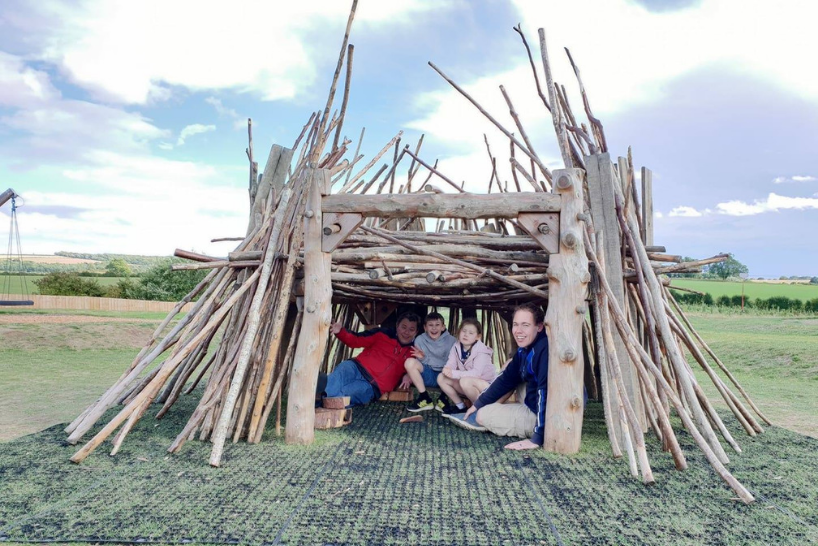
“Parents teach children life skills through play. That’s what we’re all about.”
Kelly Molson: Let’s take a little step back because I’d like to understand how this decision was made that this was what you were gonna do. What were your backgrounds before William’s Den?
Christian Carver: Mine was very much farming and sort of a formal education in farming in an agricultural college. And then, actually, I went into insurance bizarrely enough and dealt with insurance claims.
Tor Carver: Very handy.
Kelly Molson: Very handy.
Christian Carver: I did that for about ten years. So another skill set was born there. But I always had an interest in and still had an involvement with the farm and with the rest of the estate, that includes the woodland and property and so on that we have.
And actually, the holiday cottages that we started, that was another acorn if you like for starting this idea. Because we realised that we were sending people further afield because they were saying “Where do we go and what do we do when we come to stay with you.” And we were saying “Well you go to the coast or you go to Hull or you go to York.”
There wasn’t anywhere on our doorstep of a suitable standard or quality for visitor attractions. And we thought, “You know, maybe there’s an opportunity here.” And I was always very keen to give people more access to the countryside and to the farm and to, if you like, show off what we’ve got. What a beautiful area we’re in, and that was all part of it as well really.
Tor Carver: Yeah. I come from obviously, a farming family but I actually ended up being a TV producer and Director and I absolutely loved it. I have also done some film direction, and dipped my toe in feature film… Well, that’s not quite true.
I started doing short films but I, when I met Christian actually, I was thinking of going to America to really go for it. But then obviously that stopped me in my tracks and I decided to stay in East Yorkshire. I am from East Yorkshire by the way, just down the road. But I’d never met him before I disappeared off down South and abroad and then came back, you know. It’s all a bit random.
Tor Carver: But I think one of the catalysts for us was actually having William. Because I stopped working in the TV business then, because I didn’t want to travel so much. And it was when his friends started coming to play that we realised gosh, he is so fortunate in this day and age. Because he does have access to the stream and the garden.
We’re very lucky we’ve got a stream that runs through our village. He has woodland at the edge of the garden, fields to run and you know, scream and jump about in and muck about with his friends. And it’s almost like going back in time if you come to our house.
We were watching how his friends would react and they didn’t necessarily live on farms. And they were absolutely loving it. Soaking wet, covered in mud, filthy from top to bottom, but they’d had the best day ever.
Tor Carver: And so it sort of helped us formulate ideas, didn’t it? We thought right, we could be on to something here because it’s actually not complicated. What we’re trying to do is strip it all back.
We know as a family ourselves that when you go for a day out you’re almost expecting… Oh I’m trying to think. What’s the way of describing it? When you go for a day out today you’re expecting the big wow. To be hit with this, you know, fancy ride or this really amazing thrill. But it’s actually, it’s a very one-dimensional experience. There’s no imagination. You go, you open a door, you sit in a carriage, you get strapped in and off you go around a big dipper or something.
Tor Carver: But what we were trying to do is strip that all back to actually, this is nature. Connect with nature around you. A lot of children don’t have a clue and their parents don’t because they’re younger than us, and in their generation they weren’t allowed out as much. And they didn’t get to learn about how to grow your own carrots and potatoes in the garden. All of that was involved in how we came up with William’s Den.
Christian Carver: Yeah, and even just the simple things like watching. If you watch children with, I don’t know, feathers, sticks and stones and a bit of water and a cardboard box you’d be amazed how much fun they can have.
Just the simple things, the creativity, the imagination, all the fun that goes with it. Give them some simple materials – as Tor says, we’re sort of almost brainwashed into thinking we have to go somewhere that’s full of technology and bright lights and shiny things. When, actually, there’s a lot of stuff in our own gardens or our own sheds that can do.
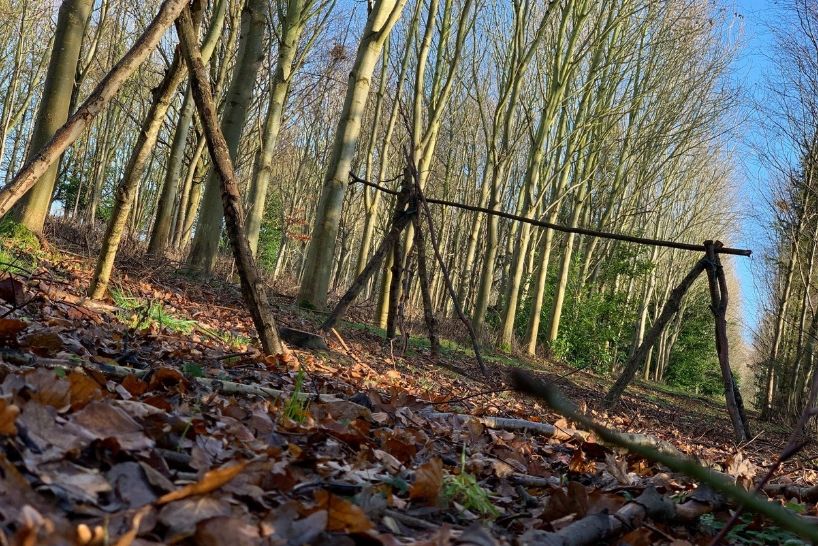
Simple things are fun – William’s Den doesn’t overcomplicate things.
Tor Carver: I can remember there was one day when William was in the yard and there was a crisp packet that had floated off the street, I think, into the yard. And he chased this crisp packet. It was obviously a warmish day and there were air pockets. This crisp bag went all over the yard and he must have been out there an hour and a half just chasing this thing around. And it’s that, he was obviously enjoying every minute of it, but it didn’t require anything complicated or expensive.
Kelly Molson: I love that. I love the idea of it being completely stripped back and you being able to play and enjoy and have fun with just those simple things that are so easy at hand for you there.
Christian Carver: Yes. And we have stripped it back to nature if you like.
Tor Carver: And there’s just so much evidence as well today that getting outside and being outside and being at, I know it sounds a bit naive, but being at one with nature is so good. It’s not just good for adults, it is so good for children. So many children have anxiety issues and all these pressures that we certainly didn’t feel when we were growing up.
Thank goodness we were allowed an innocent childhood. That plays a part here. But we never ever want to be preachy about it.
Tor Carver: It’s almost like we’ve created this place on this playscape and if you live in a flat five minutes away, use it as your back garden. Don’t worry about not having your own back garden. Come here and get out there and use it to your heart’s content. And we’re always trying to think of something new but simple that we can add that will just improve a family’s experience here.
Paul Wright: So, how do you come up with the ideas for William’s Den and then how do you decide on which ones to go with?
Christian Carver: Well we spent about five years doing, thinking, head-scratching, putting bits of paper all over the kitchen wall, writing ideas on saying yep, nope, maybe.
Paul Wright: Yeah.
Christian Carver: And really we did research, research and more research. We travelled all over the UK, we went to Europe, went to Germany, went to Holland, even went to America. Just to see how the best of the best do it and just to sort of get some ideas and just to further our knowledge.
Because neither of us comes from a visitor’s attraction world. So we were wanting to do as much background work as we could to make sure that we got it as near right as possible when we started the design process and then opened the doors. So yeah, a lot of research and as I said about five years before we actually put in for planning.
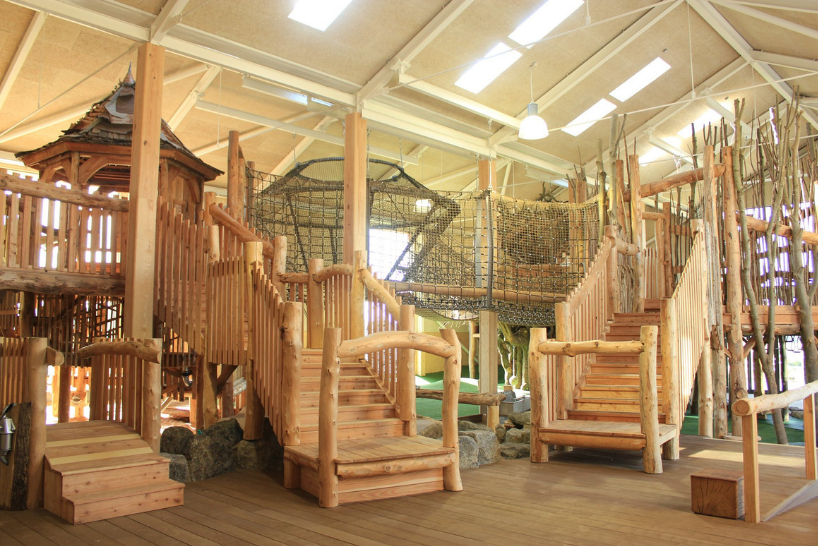
The duo travelled the world to research their play areas and offerings
Paul Wright: Well that’s amazing. It just shows that research really does help though, doesn’t it?
Christian Carver: It does. And also engaging or working with experts, play experts, designers and so on and so forth. Picking the right people. Consultants are expensive but if you’ve got the right ones then you can make a success of it, or help make more of a success of it really.
Paul Wright: So, when you first started up, what were the main challenges you kind of faced?
Christian Carver: We had a lot of infrastructure challenges. Because we are, because William’s Den, is located on a remote farmstead we are outside of the village. So we had to improve our access.
The farm access didn’t comply with highways regs, distances and so on, for visibility. So we had to put a new entrance road. We had to put in three-phase electricity because we didn’t have enough power here. We had to put in our own waste plant for human waste because we’re not on mains drain. We had to improve the connectivity in terms of WI-FI. So we had to get fibre connected up from the village.
Paul Wright: Wow. That’s never easy.
Christian Carver: No, quite. All the typical…
Tor Carver: The tap water supply.
Christian Carver: Oh yes. We didn’t have sufficient pressure, water pressure. So we had to put in a new connection. And then we also had to put in a great big 45,000 litre tank to satisfy the fire officer. We had to, because we didn’t have enough water pressure for a hydrant in case of the dreaded emergency.
So we’ve got a big tank for the fire brigade to tap into should it be needed, and hopefully it never will be needed. But it’s there. So that was a big investment as well in its own right. So yes, a lot of infrastructure challenges. Which if we were on an industrial estate, we wouldn’t have had.
Paul Wright: How long did all that take to get set up?
Christian Carver: Well, it was all part of the build really. But obviously, it did extend the build time. The idea was that we started in sort of May, June ’16 with a view to open in Easter ’17. But unfortunately, the main contractor who was doing the main build element of it went into administration in January 2017. So that put us right back and we didn’t actually open until July 2017.
Kelly Molson: Gosh. That must’ve been a huge disappointment at the time.
Christian Carver: It was, because we hoped to open at Easter, or just before Easter. Have a bit of a soft opening, then open. Have a mad sort of two or three weeks over the Easter period. Learn from that, move on, hit the May holiday period and do well then. And then learn again, move on and then go for the summer.
But we opened just before the main holidays in 2017 and then we had three months of absolute madness and 50,000 visitors later we were sort of like “Whoa, what’s happening?”
Kelly Molson: Wow. Nothing like jumping in at the deep end with two feet.
Christian Carver: Absolutely. And that expression is well used. But it certainly applied to us.
Tor Carver: Another challenge was finding the right team. We’re in a very sparse area. Our population is a bit thin on the ground and there aren’t too many visitor attractions.
Finding people who had any experience was actually quite difficult for us. And because of the difficulties with the contractor’s major hiccup, that also didn’t help us with knowing when we were going to open. So that was quite a challenge.
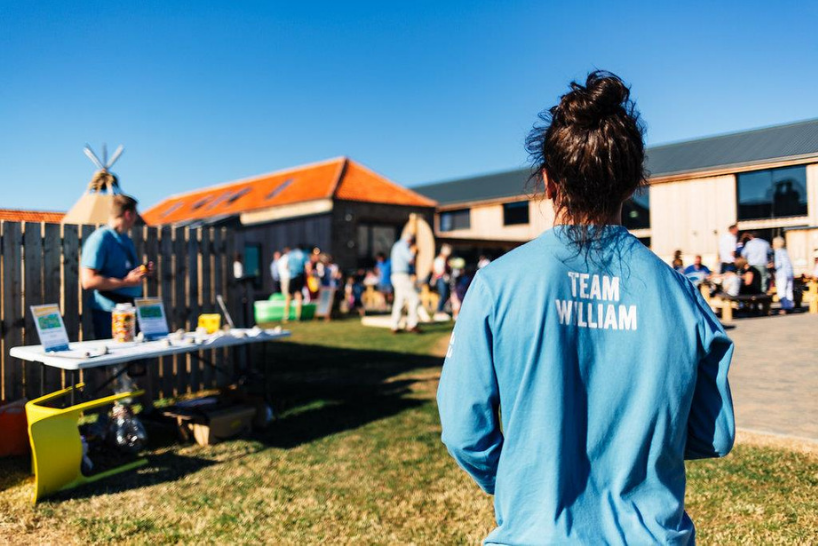
Recruitment and finding the right team has been a primary challenge
Christian Carver: It was. It was but we’ve been very lucky with our team. And we got some wonderful local people that work for us and we’re very proud that we do employ a lot of people within a 15 mile radius. But certainly, a lot of them are a lot less than that, as in very local villagers. So that’s been hugely rewarding for us.
Paul Wright: What do you look for in people when you’re hiring?
Christian Carver: Gotta be fun, personality and fun. It’s all about customer service and we are a fun factory really.
Tor Carver: We are. We set out wanting to be the kind of employers we would have liked to work for over the years. And I think you don’t really know until you start employing people what it is they need from you as a boss.
We’re very much about trying to nurture the younger members of the team. Ensure that they’re given access to training. I mean, I look back at my own life and I don’t think anybody ever invested one pound in training for me.
Everything I ever did was on the job. You know, learned as I went along. But sometimes it would have been really helpful if I’d had two day course on such and such.
Tor Carver: That never happened to me. But we are really keen to ensure that they’re constantly being topped up as it were. Especially on the customer service and delivery front. Because if you’ve got an 18 year old who comes to work for you, they might not have done so much before they came. They may have been babysitting, but don’t have an awful lot of work experience.
There’s an awful lot to learn as an individual and it’s about little signs and nuances and understanding the customer’s needs. You know, you don’t know anything about being a mother or having three kids that are having a tough day or have had a bad start to the day. And the way that you welcome a family who have probably had a fairly unpleasant journey for all kinds of reasons. Someone has been sick in the car or mum and dad have had a row as they’re coming or something’s gone wrong.
Tor Carver: And actually what they need is from our team is pure joy, pleasure, sunshine as soon as they get here. And that’s what they need. You know, for us, it’s really important that we help get every single team member to a point where they understand that.
Christian Carver: And I think yeah, I think it’s important that you know, there’s a big difference between an average and exceptional visitor experience.
Tor Carver: Yes.
Christian Carver: And going back to the very beginning we, Tor through [through the board of Highland East Riding Association] came across a chap called John Lennon who’s from the Buffet Centre in Scotland.
We commissioned him to set up and deliver something that we call Kids First. So that’s K, as in kindness to all, interest to everyone, desire to help and service with a big smile. So that’s what we’re all about really.
Kelly Molson: That’s lovely.
Paul Wright: That’s great.
Kelly Molson: Absolutely lovely.
Paul Wright: That’s really good. And I suppose, is that something that you always talking to your employees about, making sure they stand by that?
Christian Carver: Yes. And we try to every now and again have a bit of a get-together and just reinforce that. And we’ve had one or two other people come in and help train and just get the message across to the new team members. Because we have a lot of young people come to us just for holidays and half term and weekend work. So you know, to the effect that they…
Tor Carver: Yeah, it’s quite transient.
Christian Carver: They need to be brought up to speed on what needs to be done on a fairly regular basis. But we have had some excellent feedback in our recent survey. Again, reinforced how well they’re doing with that. So yeah, all very positive.
Kelly Molson: Let’s talk a little bit about sustainability. Because this is something that runs through the core of William’s Den. Everything there has been built to be sustainable or reused in some way. Was that, I mean essentially, was that what you wanted from the start or did that kind of grow organically?
Christian Carver: Well we initially had talks with an architect and they very much like to use sustainable materials in everything that they do. And we even thought about having a most enormous straw bale building for the indoor den.
But we got slightly cold feet about that and there were a few construction issues and other concerns and we actually decided not to do that. But from then on we did look at, and our architect proposed, various materials for the build that we did use and actually it’s all paid off.
Christian Carver: We’ve got hemp blocks in the walls, wood fibre insulation in the walls. We have recycled glass products both under the floors and, again, in the walls as insulation blocks.
We have solar panels on the roof. We have a rainwater harvest system, so we take all the water off the roof and use that for the loos. [We] actually worked out the other day that since we’ve opened we’ve recycled something like 2.1 million litres of water through our loos.
Kelly Molson: Wow.
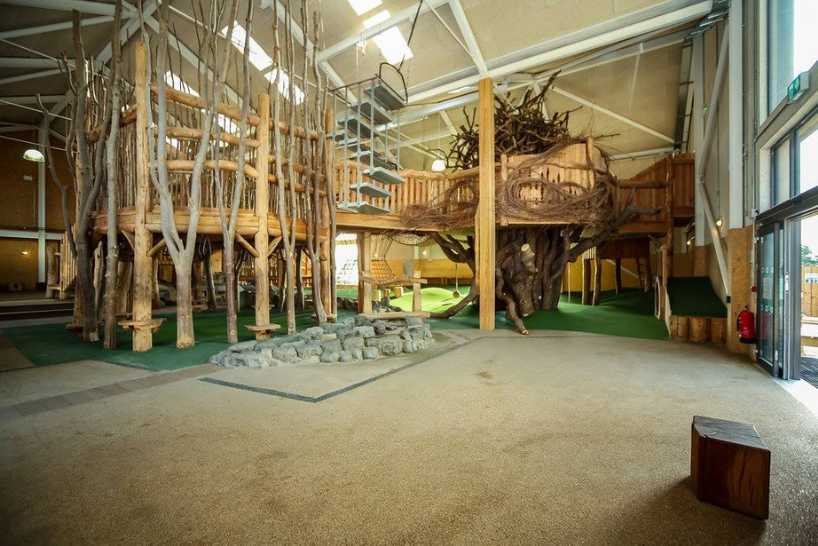
The Den features incredible, sustainable architecture
Christian Carver: So that is a really great start. Then things like wood wool boards, those are on the ceilings and on the walls in a lot of places. And they are made of basically shredded wood which are byproducts from the timber industry, otherwise, waste products, and they’ve been made into 20 mil panels.
Not only lovely to look at, but they are excellent acoustically. So they absorb a lot of sound. They are waterproof, rustproof, all those sort of things. Fireproof, importantly. But they have a lovely look and a lot of people remark on them. And actually one of the best things is they do absorb sound fantastically well. So in the indoor den, we don’t have that typically echoey, noisy sound when lots of children are playing. Which parents appreciate enormously.
Tor Carver: But I think when [you] embark on the project in this day and age, you’ve really got to have a very good reason for not employing green values or going down the greener route.
I don’t think we’d have been very happy if it was all concrete breeze blocks and we hadn’t considered anything green at all. I think it helped enormously having the architects on board who could explain the values of these products.
Tor Carver: Of course you’re always on a budget. So we were having to balance well, “If we do that is there a cheap…” It was always going to be a bit more expensive. Nothing seemed any cheaper. [We asked] “Can we save a bit of money elsewhere?”
Christian Carver: But actually the building does work very efficiently. We have our biomass boilers – wood chip goes through that. Ultimately the efficiency of the building is excellent.
We’ve got a combination of new and old – we’ve got some old barns, old sort of brick and stone barns that have been converted into our kitchen table restaurant and the kitchen area as well. And that merged with the new build – [it] did actually get an A rating for energy efficiency, which is exceptional considering the mix.
[Old build] is hard to insulate, hard to make efficient, hard to make sure there are no gaps and no air escaping, et cetera, et cetera. So yeah, we’ve ticked a lot of boxes and one of the many awards that we won did relate to the build. To the architectural side and the build side. So that was very pleasing.
Paul Wright: So, do you still have a working farm there? Or was it just you completely converted it to William’s Den?
Christian Carver: Well there were some grain stores and other buildings here, yes. That obviously doesn’t exist anymore. We’re still a working farm in so far as there’s an arable operation. So there are lots of crops being grown around William’s Den. People can see those in the distance which gives them that connection to the countryside.
We’ve got nearby grass fields. We’ve got some sheep grazing. So it’s very much a rural feel, but the farming is done by contractors for us, so not so much hands-on anymore. It’s done by others. But yes, we do still farm.
Kelly Molson: Do you think that now that we’re in a world where we are making better choices, more ethical choices, do you think that the sustainability side of William’s Den helps people to choose you over other visitor attractions?
Tor Carver: Well I certainly think it helps and we’re probably not being strategic enough about it, as in not using it enough to promote William’s Den.
It can only make the adults deciding to come here feel a little bit better about themselves. It makes you feel good when you take the decision to spend your money in a place that is actually helping to protect the environment in whatever small way it is. It can’t have a negative impact.
Christian Carver: You know, clearly our play equipment is all wood apart from the odd aluminium slide. But essentially all our play equipment is not plastic, not metal, it’s all wood. And some if it’s our own timber from our own woodland. That is clearly a very sustainable build even in a play. But as well as that we don’t have plastic straws anymore. We use napkins that are 100% compostable. We have water in cans.
Those sort of things we do to be more mindful and to have less [of a negative] impact on the environment. So we’ve always got an eye on it, yes.
Paul Wright: I just want to go back to something you said earlier. It is correct that you had 50,000 visitors when you opened?
Tor Carver: Yes. Yes.
Christian Carver: In our first three months, which was July, August and September, yes. And we’re now at about 215,000 visitors. And actually this year, our first full month we, in January, February, March, April, we are 55% up.
Tor Carver: Up on last year.
Christian Carver: Up on last year.
Kelly Molson: Wow.
Christian Carver: Those are visitor numbers.
Kelly Molson: That’s incredible. Well done.
Tor Carver: Thank you.
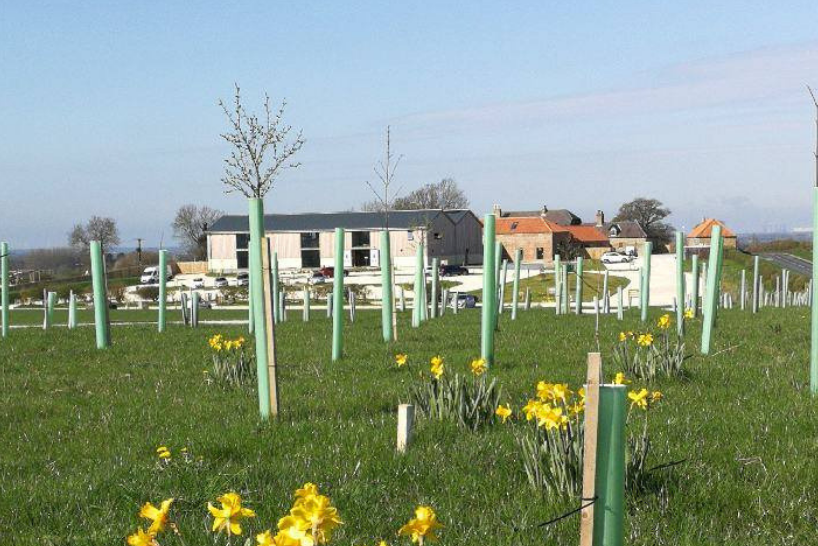
William’s Den has catered to a huge amount of visitors
Christian Carver: Thank you. So yeah, but it’s large. And a lot of it, thankfully, is down to recommendation and word of mouth. Which there’s no better way of getting yourself out there and known. People are going away saying “I’ve had a fab time, you must go”, and it’s a great pat on the back for us and for our staff.
Paul Wright: Well that is, that was gonna be my question actually. How did you, how do you think you got 50,000 visitors so early on?
Christian Carver: We did get a lot of traction in the build-up and that was definitely down to the people that we’re doing our marketing. They helped considerably with the plan for that and we did invest with that, and it certainly paid off with an eager anticipation for us to open. And I think perhaps even the delay in opening possibly even helped in a bizarre sort of way.
Tor Carver: Yes, I think we were offered the opportunity to sort of try and do a fly on the wall documentary or, I don’t know what you wanna call it, you know, shall we go out to production companies talk, Christian. And see if we can sort of get you out there before you’ve even laid a brick. And of course, coming from the background I come from I said no way. Probably was a good thing given that the contractor failed on us near the end, because there was an awful lot of swearing went on at that point.
Tor Carver: But I think we had very good storytelling as we were building to open, you know. The team, Rach and the team were very good at that. Without a doubt. I think that and possibly the fact that there isn’t so much in East Riding and it was locally quite a nice story. We definitely have a lot of well-wishers.
You know we consulted before we started, hadn’t we? We consulted with the village. We wanted our village, North Cain, to really feel that they were a part of this and they’re really important.
Tor Carver: There’s a school in North Cain, and we’ve always felt we want this school to feel like William’s Den is theirs. Because anything we can do for them we want to be able to do. We want to support them in anything that they do.
So we had a load of children come round when we were building, didn’t we? And it was fantastic. Their faces and their reaction was awesome. So I think there was a lot of goodwill, wasn’t there? Before we opened.
Christian Carver: There was, there was. And I mean Facebook is massively important for us and we’re now I think just under 20,000 followers. So the growth on that is significant. I haven’t got the stats, unfortunately. But that’s very much on an upward curve still. So that’s been, yeah, terrific.
Paul Wright: Do you spend a lot of your marketing budget on Facebook?
Christian Carver: Well it’s actually been relatively cheap, isn’t it? Compared to everything else. So I would say we don’t spend much at all compared to everything else.
Tor Carver: I think…
Paul Wright: Wow.
Tor Carver: For me, certainly one area that I was very, very keen on getting right was the look and feel of the den, of William’s Den. Our branding, logos, our colour schemes. There was no stone left unturned. But we had a brilliant agency in Wrapped and because they got us, they totally understood me, they knew instantly whether I’d like something or not and whether I felt it was right for us.
And we still, among the same conversations, were very tight on even down to the language we use. We have a much better understanding of what our voice is, our tone of voice is and whether or not would we say it like that? No I don’t think we would. That’s not the way we would say things.
Tor Carver: We’re not braggarts. We have had to, Christian and I, have had to get over, or me particularly, shouting about who we are and what we do. Because I’m, we naturally, we don’t boast or brag. So that’s been something we’ve found, I’ve found particularly difficult. Whether it’s on social media or giving an interview or writing an article. It still isn’t so natural to me. But I understand that if we don’t do it nobody’s going to know about us.
The design was very, very key for us and for what we do. Whether it was the green aspects or sustainable aspects or what do children like. We’ve designed some characters and we’ve got an illustrator called Tina who works for us. And we always wanted a William character and William and his friends. But it took me weeks to work with Tina to actually come up with what the characters would look like.
Tor Carver: So every little detail, we care about. We don’t let anybody run off without us saying no or yes. We’ve always got final say. And I think that’s key when it’s your business, it’s your baby, it’s your vision. We’ve also learned that you can’t let go, especially in the early days, we’re not two years old, ultimately the buck stops with us. We’re responsible for our team. We never want to leave them in the lurch or worried that they’re doing or saying the wrong thing. We’re there, we’re backing them up all the time and we’re teaching them, this is the William’s Den way.
Kelly Molson: That’s really lovely to hear. It sounds like you have got a brilliant team around you and a really good relationship with the people that you work with. Which is brilliant.
I just want to go back to something that you said earlier that was really lovely. You spoke earlier about people coming back and using William’s Den as their garden. One of the things that our audience will be quite interested in is understanding how do you do that? How do you encourage those repeat visits?
Sometimes visitor attractions will put on different shows or put in a new ride, you know. How do you kind of get people coming back and how do you keep them engaged?
Tor Carver: When we travelled around the world, we realised the best places were [high] quality. The quality of the food offered, the quality of the hot drinks offer, the quality of the surroundings. Whether it was clean, immaculately clean, a bit gawdy, a bit greasy. For us, that’s what we felt would certainly endear the grownups to us.
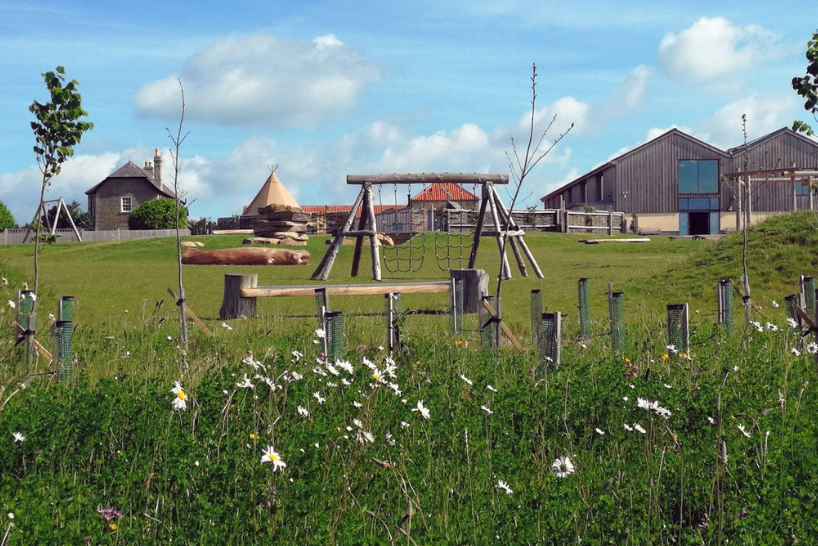
High-quality areas and cleanliness are top priorities
Tor Carver: It’s quite tough. I’m not a huge fan of indoor play barns – I can’t stand the noise. They always looked sticky, smelled revolting, sweating, everything I hate when I’m going out with my child and meeting up with friends. And so for us it was really, really important that what we did was offer decent cups of coffee, in decent china that was clean from a waiter who had clean fingernails and a nice uniform and was tidy and looked like they wanted to be there.
So, all of that was part of how are we going to get people to come here and love it so much that they will then come again.
Christian Carver: Yeah. And it’s all about the customer journey as well. Making life easy, as Tor says, and looking at things not just through children’s eyes but through parent’s eyes to make sure the parents have as much fun as their children. And you know…
Tor Carver: And a level of comfort as well. A sort of assurance that the loos are gonna work or the loos are immaculate. The very small details we thought about, didn’t we, before we opened.
Christian Carver: Yes. And our aim was always to surprise and delight. So when people came they were actually surprised by how good or how different it was and they were delighted with everything that they found and saw. And even down to the loos we did that. We have some unisex loos, but we have doubles within each individual loo. So a mum can take a son or a dad can take a daughter. We try to think about everything all the way through and make it a really positive, good experience.
Tor Carver: And you can get your pushchair in the loo.
Christian Carver: Yeah.
Tor Carver: You can take a buggy in. I insisted on it. Taking a double buggy into the loos, if you’re a parent or a grandparent taking two children into the loos, how on earth would you do it? And you’d go into one of our four family loos and you could get them both in there. There were two loos in there, they could wash their hands, dry their hands, the whole caboodle. And what we found with our loos is we never have a queue, ever.
Christian Carver: Yeah.
Tor Carver: There’s never a queue.
Christian Carver: Having enough loos, yeah. But again you guys, you asked about how we go about getting people to come back and you know, it’s all about added value at peak times as well.
So, when it’s half terms and holidays, we try to do a lot more little extra activities and events that are elaborate. You know, going around the outside and coming back and getting an Easter egg, and things like that. Or little sort of freebie bits and events going on that ultimately extends the dwell time and makes people think they’ve got a better value for money.
And also, if they’ve spent [on entry], they might buy another drink or another ice cream or something like that. It’s all about the extra spend, isn’t it?
Tor Carver: I will say that we’ve got a team headed up by brilliant Lucy, who is the best entertainer in the world. She can bring a smile to anyone’s face and she just loves kids. So, when she’s out there doing an extra activity she will have 30 or 40 or 50 children doing a bunny bop to some music.
Might not necessarily be quite what we envisaged but it works a treat and the kids have a fantastic time as do the parents or grandparents who are joining in. She and the team add value to the little added extras that we put on. It doesn’t necessarily mean that we bring the circus to town or have to do that to change things up a bit.
Christian Carver: Yeah. And we have a membership scheme. That’s all individual prices at the moment, but we realised we need to have some family memberships at discounted rates. And we’re revisiting that, learning from that and about to introduce a new level and some new offers imminently.
Kelly Molson: And that’s Friends of the Den isn’t it? So that’s your kind of yearly membership.
Christian Carver: Correct.
Paul Wright: How does that work, the memberships?
Christian Carver: Well at the moment, it’s individual. But as I say, we’re looking to introduce it for families of four, five, six or more. Which will obviously give a discounted rate or heavily discounted rate and also be an easy to enter direct debit scheme.
So they just pay one month upfront and off they go. And it’s just all very straightforward, all very easy to sign up. No big down payments or anything like that to enter. And they get a lot of benefits through the year on their membership, whether it’s discounts in the shop or the restaurant or they get priority bookings or they get invited to certain things that we’ll do for our Friends of the Den. So there are lots of benefits for that as well.
Paul Wright: Okay. I’ve got one question and it’s quite a big one.
Tor Carver: Okay.
Paul Wright: If you were going to give one piece of advice to someone who wanted to open an adventure attraction, what would that be?
Tor Carver: You’ve lost it.
Christian Carver: Think about your brand. Think long and hard about your brand and be true to your brand all the way through. If it doesn’t fit with your brand don’t do it.
Tor Carver: Yeah. My tip would be actually, to be true to yourself and listen to your gut. Your gut tells you an awful lot. There’s a lot of people out there who have a lot of ideas and theories and experience supposedly and listen to you, you know.
Trust your own instincts. Because I think often I wavered when actually I should have just gone along with what I thought in the first place. Because you know your business better than anybody else and you know your vision. You understand where you want to start and where you want to go. So trust your own instincts, definitely.
Kelly Molson: Okay. That’s very, very good advice Tor. One last question as we come to the end of our podcast interview. What’s next for William’s Den? What does the future hold?
Christian Carver: We’re very excited about the future really. We’ve still got a lot to do even though we’re two years old, we’re still learning. I think the first year was a steep learning curve. The second year’s all about fine-tuning the model and the engine. I’ll often compare it to an engine and fine-tuning it. And I think years two and three are very important for us as we continue on our steep learning curve and growth curve and visitor number curve. But who knows. We are thinking somewhere in the distance about the possibility of another William’s Den and you never know. That is the ultimate vision.
Kelly Molson: That is exciting. Expansion plans.
Christian Carver: Yes. Scary but you know, maybe. Absolutely, why not.
Kelly Molson: Why not indeed. Thank you Tor and Christian. Thank you so much for joining us today. We’ve loved speaking to you.
Tor Carver: Thank you Kelly and Paul.
Kelly Molson: Absolutely.
Christian Carver: Yeah.
Tor Carver: It’s been great.
Christian Carver: Thank you very much. It’s been a pleasure.
Do you know someone we should be talking to?
Do you know someone fascinating we should be talking to?
If so, email us at info@rubbercheese.com – we’ll get back to you shortly.
Image credits: William’s Den.

Related articles
Podcast
Inside Hertfordshire’s number one tourist attraction with Lynn Whitnall
Podcast
What makes a successful escape room? We get the inside scoop from CryptX founder, James Ducker
Podcast
We’ve launched Skip the Queue, a podcast for visitor attraction professionals